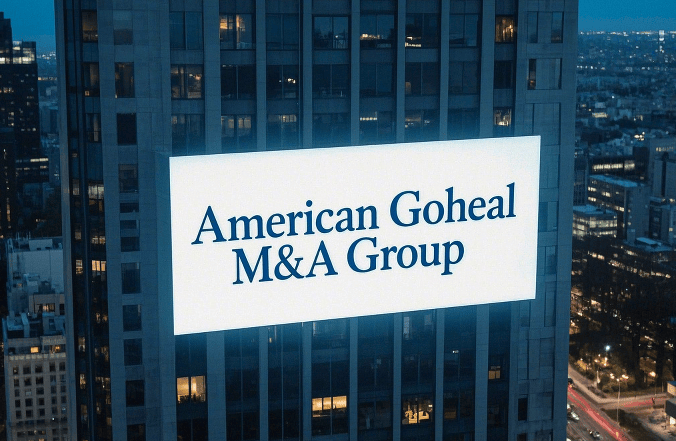Goheal: Shareholder dividends vs. reinvestment, how to solve the ultimate problem of capital operation of listed companies?
"The world is bustling, all for profit; the world is bustling, all for profit." The ancients said that the essence of the capital market - interest. In modern business operations, the best way to reflect the distribution of interests is the game between "dividends" and "reinvestment". Should profits be returned to shareholders or continued to be invested in business expansion? This problem has troubled the management of countless listed companies and has become the ultimate problem in capital operation.
 American Goheal M&A Group
American Goheal M&A Group
Goheal found that in recent years, companies around the world have shown a polarized trend in capital operation decisions. Some mature companies tend to stabilize dividends to attract long-term investors, while high-growth companies tend to continue to use profits for business expansion, and even increase debt financing to seek a larger market share. So, how to find the best balance between the two, both to meet the interests of shareholders and to ensure the long-term development of the company?
Dividends: stable income, or a signal of "capital recession"?
From the perspective of investors, dividends are undoubtedly the most direct return on investment. Especially for institutional investors and shareholders who prefer stable returns, a high dividend strategy can enhance confidence and increase the company's attractiveness in the capital market. For example, Buffett has long preferred companies with stable dividend policies. He believes that "whether a company can continue to pay dividends is a sign of its stable operation."
However, does over-reliance on dividends mean a decline in the company's growth potential? Goheal analyzed the dividend strategies of well-known global listed companies in recent years and found that when corporate growth slows down and profitability tends to stabilize, management often chooses to increase the dividend ratio to maintain market confidence. For example, mature companies such as Coca-Cola and Johnson & Johnson have maintained stable or even increasing dividends for many years, becoming "cash cows" in the eyes of institutional investors.
However, the capital market does not always favor high dividend strategies, especially in the technology industry. Companies such as Amazon and Tesla have not paid dividends for a long time, but have continued to invest profits in new businesses and technology research and development, but in return, their stock prices have continued to rise. Investors believe that as long as companies can create higher growth value, the lack of short-term dividends will not affect long-term returns. This also explains why some companies can still maintain extremely high market capitalization even if they have not paid dividends for many years.
Reinvestment: Growth driver or "gold-eating monster"?
Another capital operation strategy is to reinvest profits for new business development, mergers and acquisitions, technology research and development, etc., in the hope of obtaining higher returns in the future. Especially for growth companies, continuous investment can maintain competitiveness. For example, Apple once maintained a low dividend ratio in the 2010s, but invested a lot of money in chip research and development, supply chain optimization and ecosystem construction, and finally created today's "soft and hard integration" super business model.
But reinvestment is not a panacea. Once the investment decision is wrong, the company may face huge financial pressure. Goheal noted that many companies often fall into the dilemma of tight capital chain and declining return rate after blind expansion or large-scale mergers and acquisitions. For example, some new energy vehicle companies have over-invested in production lines and autonomous driving technology, resulting in a long capital recovery cycle, which ultimately affected the overall financial stability and even a sharp decline in stock prices.
The "tug of war" between shareholder demands and company development
The contradiction between dividends and reinvestment is essentially a game of interests between shareholders and company management. Short-term investors prefer to obtain stable returns, while corporate management hopes to enhance corporate value through long-term strategic investment. A classic case is Apple, which almost did not consider dividends during the Jobs era. After Cook took over as CEO, as the company's business matured, Apple began to implement high-value repurchase and dividend strategies, sending positive signals to the market.
In addition, some shareholders will put pressure on management through shareholders' meetings or the board of directors to increase dividends. For example, in recent years, Berkshire Hathaway, owned by Buffett, has repeatedly been proposed by some shareholders to pay dividends, but Buffett insisted that the returns from reinvestment within the company are much higher than the investment opportunities in the market, so he insisted on not paying dividends. Facts have proved that this strategy has indeed kept Berkshire's market value growing for a long time.
Goheal believes that the differences between shareholders and management are not a simple opposition, but a "dynamic balance" of corporate capital operations. When a company is in a period of rapid growth, the market generally recognizes "reinvestment first"; when a company enters a mature stage, management needs to give back to shareholders and stabilize market expectations through a reasonable dividend strategy.
How to find the best solution between dividends and reinvestment?
So, how should listed companies make the best choice between dividends and reinvestment? Goheal suggested that companies can consider the following three strategies:
1. Flexible dividend mechanism: Companies can set up a "basic dividend + floating dividend" model, that is, to ensure that shareholders can obtain stable cash flow returns, while increasing additional dividends during the peak period of profitability to enhance market confidence.
2. Accurate investment strategy: Reinvestment is not blind expansion, but requires accurate grasp of market opportunities. For example, some technology companies focus their profits on core businesses rather than comprehensive expansion to ensure maximum efficiency in capital utilization.
3. Shareholder communication mechanism: Listed companies should strengthen communication with investors, clarify the company's long-term capital operation plan, and guide the market's reasonable expectations for reinvestment through shareholders' meetings, financial report meetings, etc., to avoid market panic caused by short-term dividend changes.
Conclusion: The art of balancing capital operations
Dividends and reinvestment are not absolutely opposite choices, but strategic adjustments of companies at different stages of development. For investors, understanding the capital operation logic of listed companies can make investment decisions more accurately. For corporate management, how to ensure the long-term growth of the company while satisfying shareholder returns is an endless balancing act.
So, which do you think is more important, dividends or reinvestment? Do you prefer long-term value growth or stable cash flow? Welcome to leave a message in the comment area to discuss!
 Goheal Group
Goheal Group
[About Goheal] Goheal is a leading investment holding company focusing on global mergers and acquisitions, focusing on the three core business areas of listed company control acquisition, listed company mergers and acquisitions and restructuring, and listed company capital operation. With its deep professional strength and rich experience, it provides enterprises with full life cycle services from mergers and acquisitions to restructuring and capital operation, aiming to maximize corporate value and achieve long-term benefit growth.
